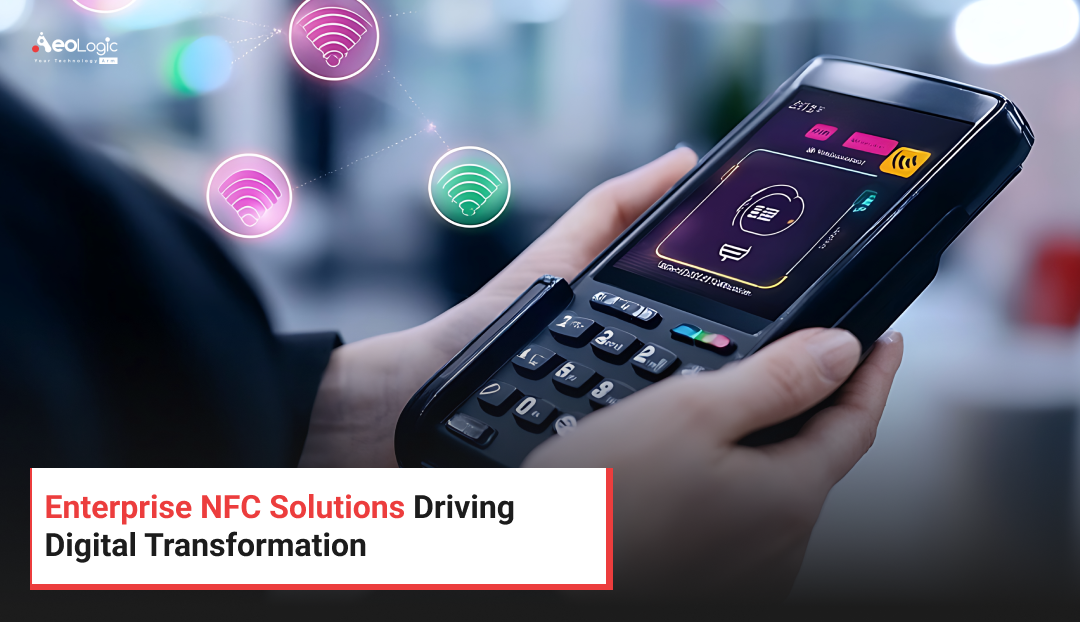Digital transformation isn’t just a buzzword anymore; it’s something that businesses need to do. Businesses in all fields, from manufacturing to logistics to retail, are looking for technologies that can help them automate processes, improve security, and make things run more smoothly. Enterprise NFC Solutions (Near Field Communication solutions made for business settings) are one of the most powerful drivers of change among the technologies that are making this happen.
NFC has changed from a consumer convenience (like tap-to-pay) to a critical business tool that can improve asset tracking, make contactless authentication possible, make the supply chain more visible, and make field operations easier.
In fact, enterprises that once depended heavily on barcodes, RFID, or manual data collection are now embracing NFC to drive speed, accuracy, traceability, and automation. And companies like Aeologic Technologies, known for their enterprise-grade automation and digital transformation offerings, are helping organizations implement NFC-powered ecosystems at scale — without disrupting existing workflows.
This blog’s first section will examine Enterprise NFC Solutions’ operation, significance, and comparison to barcode-based systems, which are frequently used by SMEs and small businesses. In a straightforward, approachable, and knowledgeable manner, we will also delve into real-world situations, useful advantages, and typical difficulties.
What Are Enterprise NFC Solutions? A Simple, Human-Friendly Explanation
Customized NFC-based technologies intended to address business issues like these are referred to as enterprise NFC solutions.
- Automated asset management
- Workforce authentication
- Visitor access control
- Field service operations
- Inventory management
- Supply chain traceability
- Contactless interactions
- Smart manufacturing automation
Unlike consumer-grade NFC (used in phones or small gadgets), enterprise solutions require:
- High security protocols
- Long-term durability
- Integration with ERPs, WMS, CRMs, and IoT ecosystems
- Scalable architecture
- Interoperability with cloud platforms
- Professionally designed tag mapping
- Real-time data analytics
For this reason, businesses collaborate with seasoned digital transformation firms like Aeologic Technologies, who specialize in creating scalable, safe NFC ecosystems that are customized to meet the needs of individual businesses.
Why NFC Has Become Essential in Modern Enterprises
NFC used to be primarily used for mobile payments. However, it now affects practically every aspect of business operations. Its rise has been attributed to three significant changes:
The Move Toward Contactless Processes
Since the pandemic, industries have favored systems that reduce physical contact; NFC offers the safest and fastest tap-based interactions.
Need for High-Speed, Accurate Data Capture
Businesses cannot afford human error. Even in hectic settings like manufacturing floors or supply chains, NFC provides accurate, real-time data capture.
Growth of IoT and Intelligent Automation
Cloud dashboards, sensors, gateways, and IoT devices all work flawlessly with NFC. This makes it possible to monitor and make decisions in real time.
Because of these shifts, Enterprise NFC Solutions are now used to:
- Track assets across large facilities
- Validate maintenance activities
- Authenticate employees without ID cards
- Manage production lines
- Improve audit trails
- Enhance compliance
Aeologic Technologies assists businesses in implementing this type of automation, making sure that technology genuinely resolves issues rather than adding complexity.

How Enterprise NFC Solutions Work (Explained with Real Examples)
To understand NFC’s enterprise capability, imagine these scenarios:
Scenario 1: Field Technician Verification
A maintenance technician arrives at a site. Instead of filling out manual logs:
- They tap their phone on an NFC tag fixed to the machine
- The system instantly verifies who they are
- It logs time, location, and task type
- It displays the machine’s maintenance history
- It updates the central system in real time
This eliminates fake visits, missed logs, and manual errors.
Scenario 2: Factory Asset Tracking
Every machine has an NFC tag. Workers can simply tap the tag to:
- Report breakdowns
- Log maintenance
- Check past issues
- Access digital manuals
- Verify spare parts
Managers now get real-time visibility instead of chasing spreadsheets.
Scenario 3: Access Control Without Cards
Instead of physical ID cards:
- Employees authenticate themselves using NFC-enabled devices
- Visitors receive NFC passes
- Access logs update instantly
- No more lost IDs or card replacements
This improves security and reduces operational costs.
Similar NFC ecosystems have been deployed by Aeologic Technologies for manufacturing, logistics, utilities, and healthcare organizations, greatly reducing manual labor and boosting efficiency.
Key Benefits of Enterprise NFC Solutions
Here are the most impactful benefits enterprises experience:
Faster Operations with Tap-Based Interactions
NFC interactions take less than a second. This speed is extremely valuable in:
- Manufacturing
- Warehousing
- Field service
- Retail operations
- Facility management
Employees no longer waste time searching for information or manually filling logs.
Enhanced Accuracy and Fewer Human Errors
Manual data entry always invites mistakes. With NFC:
- Data is captured automatically
- Workers can’t falsify readings
- Timestamp + geo-coordinates add traceability
- Workflows become predictable
This accuracy is especially important in industries with heavy compliance requirements.
Stronger Security and Authentication
NFC supports encryption, secure channels, and controlled access.
It can be used to:
- Authenticate workers
- Grant or restrict access
- Ensure accountability
- Prevent unauthorized operations
This is a major upgrade from traditional barcode systems, which can be copied or tampered with.
Real-Time Visibility for Managers
NFC-powered dashboards offer:
- Live location tracking
- Device/asset status
- Maintenance logs
- Workforce movements
- Work progress
This helps managers make data-backed decisions quickly.
Reduced Workload and Simplified Training
Tap-and-go workflows require:
- Almost zero training
- No manual entries
- Minimal device handling
This is a huge advantage in large enterprises with rotating staff or seasonal workers.
Low-Cost, Scalable Implementation
NFC tags are inexpensive compared to industrial RFID tags.
And because most modern smartphones support NFC, companies don’t need costly hardware.
This makes enterprise adoption easier and more affordable.
NFC vs Barcode Systems: A Practical Comparison for Small Businesses and Enterprises
Many SMEs and retail shops rely on barcode systems because they are affordable and easy to deploy. But NFC has more sophisticated features.
Here’s a simple, practical comparison:
Barcodes: Best for Small Shops & Basic Inventory
This is where secondary keywords come into play naturally — examples include:
- Barcode solutions for small businesses
- Barcode system for small retail shops
- Small business barcode inventory system
- Affordable barcode software for SMEs
- Low-cost barcode scanner for small businesses
- Barcode label printing solutions
These are perfect for small-scale operations because they:
- Are cheaper
- Require minimal training
- Work well for inventory and billing
- Help track products
- Can integrate with POS systems
For startups or SMEs searching for the best barcode solutions for startups without significant financial outlays, barcodes are fantastic.
Enterprise NFC Solutions: Best for Large-Scale Operations
NFC goes beyond basic inventory or product scanning. It offers:
- Authentication
- Asset tracking
- Maintenance logging
- Automation
- Workflow visibility
- Worker verification
- Security enhancements
Barcodes cannot perform these tasks.
When Should a Business Choose NFC Over Barcodes?
Use barcodes if your need is:
- Basic product identification
- Simple inventory management
- Low-cost automation
- Small shop POS integration
Use NFC if your need is:
- Worker authentication
- Asset maintenance
- Compliance tracking
- Multi-site operations
- Real-time monitoring
- Workflow automation
- Integration with IoT platforms
This is why enterprises increasingly move toward NFC while still using barcodes in specific areas.
Businesses can strategically make this transition without needlessly replacing systems with the assistance of companies like Aeologic Technologies.
Real-World Industries Already Using Enterprise NFC Solutions
Let’s look at how different industries apply NFC:
Manufacturing
- Machine maintenance
- Operator verification
- Production line tracking
Logistics & Warehousing
- Package verification
- Route authentication
- Dock-level monitoring
Healthcare
- Medical equipment tracking
- Staff identification
- Patient record access
Facility Management
- Cleaning audits
- Site visits
- Attendance logging
Retail & Hospitality
- Smart menus
- Customer engagement
- Guest authentication
Across all these industries, NFC offers speed, reliability, and convenience.
Challenges Enterprises Face When Adopting NFC and How to Solve Them
Adoption isn’t always smooth. Based on real implementation experience, here are the common challenges:
Insufficient Technical Knowledge
Many organizations are unsure about how to integrate NFC systems or where to start.
Solution: Collaborate with seasoned partners that offer end-to-end implementation, such as Aeologic Technologies.
NFC, RFID, and QR Code Confusing
Selecting the appropriate technology is a common challenge for decision-makers.
Solution: Map the appropriate solution to every business process by conducting a technology audit.
Poor Tag Placement
NFC reliability is decreased by improper tag placement.
Solution: Place tags according to the type of material by following industry standards.
Problems Integrating Legacy Systems
Compatibility problems may arise with older CRMs and ERPs.
Solution: To guarantee smooth integration, use middleware and APIs.
Resistance from Employees
Employees may oppose new technology out of ignorance or fear.
Solution: Stress how NFC lessens workload while offering practical training.
Early resolution of these issues can help businesses move more quickly and smoothly through the digital transformation process.
The Role of Aeologic Technologies in This Transition
One of Aeologic Technologies’ most well-known specialties is NFC implementation. They are known for assisting industries in modernizing their operations with cutting-edge automation systems.
They offer:
- Custom enterprise NFC platforms
- Integration with IoT, cloud, and big data systems
- User-friendly mobile applications
- Training & onboarding
- Real-time dashboards
- Long-term support
For hundreds of clients in industries including manufacturing, logistics, energy, utilities, and agriculture, their NFC deployments have strengthened authentication procedures, decreased manual labor, and enhanced asset visibility.
How to Implement Enterprise NFC Solutions: A Practical, Step-by-Step Framework
It takes more than just purchasing tags and tapping devices to implement NFC in a business. Planning, system integration, user training, and ongoing optimization are necessary for a successful, strategic rollout. Here is a straightforward but incredibly successful implementation framework that is based on actual project experience and industry best practices:
Identify the Right Use Case
Every business has its own set of priorities. Determine where NFC can have the biggest impact before introducing it.
Typical high-value use cases include:
- Field service verification
- Asset tracking
- Production line visibility
- Equipment maintenance
- Security authentication
- Visitor access management
- Compliance logging
Tip: Start small — choose one workflow that is high-impact but manageable, then scale.
Conduct a Process Audit
A proper audit helps understand:
- Existing workflows
- Current bottlenecks
- Manual pain points
- Technology limitations
- Integration opportunities
For instance, Aeologic Technologies found that the client’s operators were filling out manual logs for almost twenty-five minutes every shift during one manufacturing implementation. This was cut down to less than two minutes by NFC, demonstrating a significant return on investment.
Choose the Right NFC Tags and Devices
Enterprises must select tags based on:
- Temperature conditions
- Surface material (metal, plastic, concrete, glass)
- Durability (industrial-grade tags last longer)
- Memory size
- Security levels
Pro tip:
Special on-metal NFC tags are needed for metal surfaces; using ordinary tags results in reading errors.
Construct the Backend System and Mobile App
This is where customization matters. Enterprise apps should include:
- Tap-based data capture
- User authentication
- Time-stamped logs
- Geo-coordinates
- Offline mode
- Sync with cloud/ERP/CRM/WMS
- Role-based dashboards
Known for creating these unique NFC apps, Aeologic Technologies frequently integrates them with internal ERP systems, SAP, Oracle, Microsoft Dynamics, Zoho, and custom CRMs.
Integrate the NFC System With Existing Platforms
Integration ensures that NFC data becomes actionable.
Common integrations include:
- ERP: Asset lifecycle, inventory, procurement
- WMS: Item tracking, stock movement
- CMMS: Maintenance logs
- HRMS: Attendance, workforce verification
- IoT gateways: Machine health
- BI dashboards: Analytics & reporting
Advice: To avoid system conflicts, use middleware or APIs.
Train Employees & Conduct On-Ground Testing
Even the best systems fail without user adoption.
Smooth training includes:
- Short demos
- On-ground testing
- Clear SOPs
- FAQ-based training
- Visual guides at workstations
Because NFC is so easy to use, most employees pick it up in a matter of minutes.
Implement at Scale and Track Results
Once the system is stable:
- Deploy across departments or locations
- Track KPIs:
- Time saved
- Error reduction
- Asset downtime reduction
- Worker productivity
- Audit compliance
- Continuously optimize tags and workflows
Long-term ROI and a more stable digital ecosystem are thus guaranteed.
Enterprise NFC Solutions: Deep Industry Use Cases and Examples
Let’s examine actual use cases from significant industries to fully grasp the potential of enterprise NFC solutions.
Manufacturing: Intelligent Production and Upkeep
Manufacturing plants often struggle with:
- Manual logging
- Equipment downtime
- Unverified maintenance activities
- Difficulty tracking workers across shifts
NFC solves this by enabling:
- Operator authentication
- Maintenance logs using a simple tap
- Real-time machine status visibility
- Digital SOP access
- Spare part verification
Example:
At a sizable industrial facility, Aeologic Technologies installed an NFC-based maintenance system that reduced maintenance tracking delays by 40% and increased audit compliance by 70%.
Logistics and Warehousing
In logistics, speed and accuracy drive profitability.
NFC enables:
- Package-level verification
- Route authentication for drivers
- Loading/unloading confirmation
- Warehouse staff productivity tracking
For small businesses, NFC offers richer data than traditional barcode tracking systems, particularly when multi-step workflows are involved.
Healthcare and Diagnostics
Hospitals face issues like:
- Lost equipment
- Unverified cleaning routines
- Unauthorized access
- Manual patient handling errors
NFC enables:
- Tap-based staff ID verification
- Equipment location tracking
- Maintenance and cleaning audit logs
- Patient record access via secure NFC wristbands
Both operational effectiveness and patient safety are enhanced by this.
Utilities and Field Service
Utility companies (water, electricity, gas) send technicians to remote sites.
Challenges include:
- Fake site visits
- Missing or incomplete logs
- Incorrect inspections
NFC solves these with:
- Tap-to-verify visits
- Geo-tagged logs
- Real-time updates
- Faster reporting
This eliminates fraud and improves compliance.
Retail and Experiences
Retailers increasingly use NFC for:
- Customer engagement
- Loyalty programs
- Smart shelves
- Contactless menus in restaurants
- Anti-counterfeiting
NFC adds an interactive layer that improves the customer experience, even though many small shops prefer barcode automation or barcode label printing solutions.
NFC vs RFID vs Barcode: A Clear Comparison Table
| Feature | NFC | RFID | Barcode |
| Read Range | Few cm | Up to 10+ meters | Few cm |
| Security | Very High | Medium | Low |
| Cost | Low | Medium/High | Very Low |
| Best For | Authentication, maintenance, assets | Large-scale tracking | Retail, SMEs |
| Data Capacity | High | Medium | Very Low |
| Hardware Needed | Smartphone | RFID reader | Barcode scanner |
| Environmental Impact | Durable | Very durable | Sensitive to scratches |
Conclusion:
- Barcodes = best for small & retail shops
- RFID = best for high-volume supply chains
- NFC = best for enterprise-level process automation & authentication
This is why enterprises increasingly prefer Enterprise NFC Solutions.
Best Practices for Implementing Enterprise NFC Solutions
Follow these industry-proven best practices:
- Keep processes simple and scalable
- Place tags in ergonomic, consistent locations
- Use cloud dashboards for visibility
- Adopt NFC + IoT + automation together
- Start with a pilot, then scale
- Define KPIs early
- Ensure cross-department alignment
Businesses that adhere to these guidelines see a marked increase in adoption success rates.
The Future of Enterprise NFC Solutions: What’s Coming Next?
NFC adoption is accelerating globally. The next wave includes:
NFC + IoT Hybrid Ecosystems
NFC tags are becoming gateways to IoT data. Tapping a tag may:
- Reveal real-time sensor readings
- Trigger automated workflows
- Display machine health
NFC-Powered Digital Twins
By assisting in the creation of digital copies of assets and equipment, NFC tags enhance predictive maintenance.
AI-Driven NFC Analytics
AI will analyze NFC logs to:
- Predict failures
- Suggest optimizations
- Identify bottlenecks
Wearable NFC Authentication
NFC chips for worker identification will soon be incorporated into smart glasses, wristbands, helmets, and gloves.
Secure Access and Compliance Automation
NFC will be used more and more by regulated industries (such as pharmaceutical, aviation, and energy) to automate compliance.
Enterprise operations will become more efficient, secure, and predictable as these innovations develop.
Conclusion
Globally, businesses are realizing that simplifying routine processes is the key to true digital transformation rather than relying on large, showy technologies.
Enterprise NFC Solutions make this possible by enabling:
- Tap-based automation
- Reliable asset tracking
- Digital maintenance
- Workforce authentication
- Real-time visibility
- Lower operational costs
- Stronger security
Through their seamless integration of NFC with IoT, cloud, automation, workflows, and analytics, companies such as Aeologic Technologies are assisting multinational corporations in adopting NFC.
NFC is becoming an essential component of digital ecosystems, ranging from manufacturing to logistics to healthcare and utilities. Businesses that embrace it early will have a distinct competitive edge.
Work with an experienced digital transformation company that aligns technology, strategy, and culture to accelerate business growth.
FAQs
Q1. What are Enterprise NFC Solutions?
Customized NFC-based systems called enterprise NFC solutions are made to automate business procedures like asset management, workflow visibility, maintenance tracking, and authentication.
Q2. Are NFC solutions better than barcode systems?
Barcode systems are excellent for small business and basic retail applications. However, NFC is far more potent for sophisticated asset tracking, workflow automation, and authentication.
Q3. Can enterprises integrate NFC with existing software?
Indeed. Through the use of APIs or middleware, NFC can be connected to IoT platforms, ERP, WMS, CRM, HRMS, and analytics dashboards.
Q4. Are NFC tags expensive for enterprise use?
No. Compared to RFID tags, NFC tags are significantly less expensive. Durability, memory, and industrial-grade material all affect price.
Q5. How does Aeologic Technologies help enterprises with NFC?
In order to ensure seamless adoption and a high return on investment, Aeologic offers consulting, NFC app development, tag planning, system integration, dashboards, training, and long-term support.
Q6. Can NFC help improve compliance?
Indeed. NFC produces timestamped, tamper-proof logs that speed up, increase transparency, and improve the accuracy of audits.

Manoj Kumar is a seasoned Digital Marketing Manager and passionate Tech Blogger with deep expertise in SEO, AI trends, and emerging digital technologies. He writes about innovative solutions that drive growth and transformation across industry.
Featured on – YOURSTORY | TECHSLING | ELEARNINGINDUSTRY | DATASCIENCECENTRAL | TIMESOFINDIA | MEDIUM | DATAFLOQ





